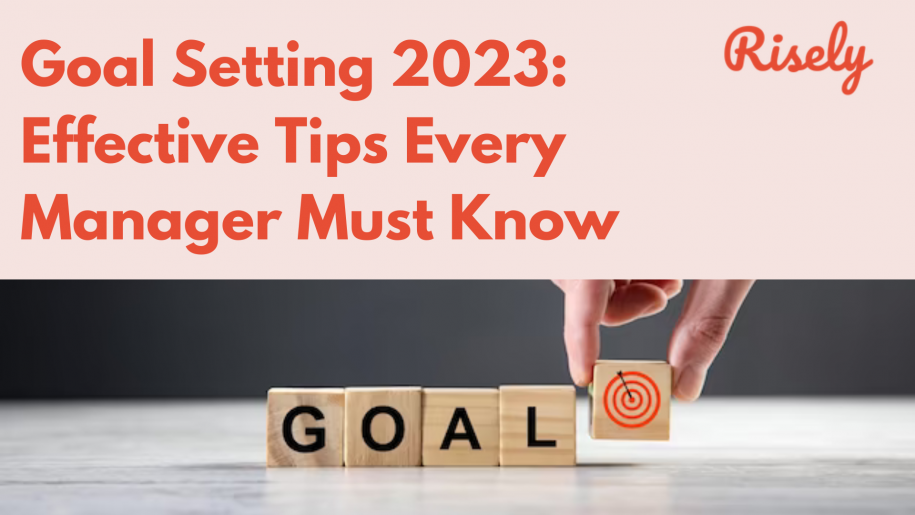Goal Setting 2023: Effective Tips Every Manager Must Know
If you’re an ambitious manager setting goals for next year, chances are you’re struggling to keep your motivation high. You’re setting goals, but they aren’t getting done. Well, that’s quite an achievement and one worth celebrating. But if goals aren’t working for you, it might be time to try something different with goal-setting in the new year. And that ‘something different’ could be anything from a new goal-setting framework to a vision board.- Goal Setting 2023: Effective Tips Every Manager Must Know
- Goal setting 2023: Understand why you need goals
- Review your successes and failures
- Test your skills to set great goals in the new year
- Reflect on what you want to achieve
- Pick the right goal-setting framework for your needs
- What goals are managers setting for the new year?
- Keep going with motivation high!
- Conclusion
- Other Related Blogs
Goal setting 2023: Understand why you need goals
Managers need goals to help them achieve their objectives and optimize their work. Goals can be individual or team-based, and they can be either short-term or long-term. Short-term goals are designed to perform a specific result within a specific timeframe, while long-term goals are meant to achieve a larger goal over a more extended period. Managerial goals can improve the efficiency and effectiveness of team members by providing clear objectives and deadlines for completing tasks. They can also help managers identify areas to improve their skills or strategies and decide which projects to pursue. Goals help us stay motivated, stay focused, and plan our lives. Setting goals specific and tailored to needs is essential as this helps build a clear picture of the goal and makes it achievable. Setting goals should be your own and driven by personal passion, as this will help you work towards it with enthusiasm. Besides, goals should be clear and written down to serve as a constant reminder and guide us throughout our journey. Without goals, it can be challenging to focus and be productive, especially in the hectic environment of a manager. Read more: 5 Secrets Of Solid Goal Setting At Work You Can’t MissReview your successes and failures
Managers should routinely review their previous performance to identify areas of improvement and ensure that the team’s goals and objectives are being met. Reviewing past performance of employees can help managers improve their decision-making abilities, identify trends and patterns, and identify best practices that managers can apply in the future. Additionally, managers can use past performance data to benchmark their performance against industry standards and other managers within the organization. By regularly reviewing their past performance, managers can ensure that they are continuously improving their skills and knowledge and fulfilling their responsibilities as leaders of the team. Moreover, managers who regularly review their past performance can develop a sense of accountability and responsibility for their actions, which can help them be more productive and efficient in their work.Test your skills to set great goals in the new year
Like any other skill, goal-setting becomes better with practice. While many of us try to set personal and team goals without thinking about them, setting specific, measurable, and time-bound goals can take time and effort. To help you develop more effective goal-setting skills, test your goal-setting skills and find out where you can improve. Risely offers free goal-setting assessments for effective managers and leaders. The free self-assessment for managers identifies the blind spots that frequently escape scrutiny. It clarifies the mistakes holding you back and sets you toward the right path that generates success. Managers should test their goal-setting skills regularly to ensure that their goals are aligned with the team’s overall objectives and strategies and that the resources and effort required to achieve these goals are realistic and achievable. By testing and adjusting the goals periodically, managers can ensure that their teams are working towards relevant and achievable targets and that the team is progressing towards its overall objectives. Additionally, periodic goal testing can help identify areas in which the company might need to make changes or improvements to its strategy or operations to achieve its desired outcomes.Other Interesting Reads
Reflect on what you want to achieve
When setting goals, it is essential to be clear about what you want to achieve. It can be difficult, as goals can often feel abstract or far-fetched. It is helpful to break down your goal into smaller, more manageable pieces – this will make achieving the goal much less daunting and give you a better idea of what steps you need to take for it to happen. Setting overly ambitious goals isn’t always bad; after all, setting lofty goals guarantees that we’ll work hard toward them! But it’s important to set realistic expectations for yourself, as well. It’s tempting to aim for the stars when setting goals, but it’s crucial that you don’t forget about your day-to-day duties in the pursuit of greatness. Set goals that you can realistically achieve with your team. Read more: Are You Setting Unrealistic Goals At Work? 5 Tips To Avoid ThemPick the right goal-setting framework for your needs
There are a number of goal-setting frameworks that can be helpful when setting goals. Some popular goal-setting frameworks include the- SMART (Specific, Measurable, Achievable, Relevant, and Time-bound) model
- WOOP (Wish, Outcome, Obstacle, Plan) model
- One-word goals
- The Golden Circle
- OKRs
- Create achievable goals – don’t aim too high or too low; try to set goals that will challenge you but still be within your reach. This way, you won’t feel discouraged after starting the goal-setting process but will actually feel inspired to reach your goals.
- Shoot for short-term goals first – many times, short-term plans are easier to achieve than long-term goals. Start by setting smaller goals that you can realistically accomplish within a specific time frame, and work on building upon those successes as you move forward with goal setting.
- Make sure your goal reflects who you are as an individual – don’t set arbitrary or unattainable objectives; instead, make sure the goal reflects your personal values and priorities. It will help keep you motivated during the process.
What goals are managers setting for the new year?
Digital transformation
With the continued acceleration of digitalization, managers are likely to set goals to leverage new technologies and digital platforms to streamline operations, enhance customer experience, and gain a competitive advantage.Sustainability
The growing awareness of environmental and social issues leads many organizations to prioritize sustainability and corporate social responsibility. Managers may set goals related to reducing carbon emissions, increasing the use of renewable energy, minimizing waste, and improving social and ethical practices.Talent management
In a highly competitive job market, attracting and retaining top talent is crucial for business success. As a result, managers may set goals around improving employee engagement, offering training and development opportunities, and creating a positive workplace culture.Personal growth and development
Many managers want to learn new skills and develop their careers, and setting goals that support this aspiration can be a powerful way to increase productivity. As a result, managers in goal setting 2023 are turning toward leadership development guided by AI that offers personalized solutions to their people management challenges.Keep going with motivation high!
Managers can help teams achieve goals by setting clear and attainable objectives, providing feedback and encouragement, and providing rewards and recognition when goals are achieved. In addition, by creating a motivating environment where team members feel appreciated and supported, managers can help teams work together more effectively and reach the goals they set for themselves. Goal setting 2023 is all about being open to new ideas and looking forward to embracing the world as it goes on, changing, and overcoming the challenges, it throws at team managers. Read more: Fueling success: The importance of employee motivation in the workplaceConclusion
Goal setting in the new year is essential for growth and development. It motivates you to work toward a goal, which in turn helps achieve your goals. Besides, setting goals gives you a plan for success. However, setting goals without considering the various aspects that come into play is futile. For managers, setting goals based on the skills of their team members is crucial. If you follow the above tips, you can be sure of effective goal-setting in the new year.Are you ready to ace goal setting in 2023?
Test now with Risely’s free goal-setting self-assessment for managers
Other Related Blogs
How to Set Effective Learning and Development Goals?
This blog highlights how effective learning and development goals are set, why is setting them important for your organization and what challenges you might face during this process. … Read…
Are you on track to meet your Q1 goals?
Are you on track to meet your Q1 goals? We are in the middle of the first quarter of 2024. Seems hard to believe. It surely is! ⏰ Time has…
5 Secrets Of Solid Goal Setting At Work You Can’t Miss
5 Secrets Of Solid Goal Setting At Work You Can’t Miss “I don’t focus on what I’m up against. I focus on my goals and I try to ignore the…
Understanding the world of Goal Setting Coach to reach new heights
Understanding the world of Goal Setting Coach to reach new heights Setting and achieving goals is essential for personal and organizational success in today’s fast-paced and competitive work environment. However,…


